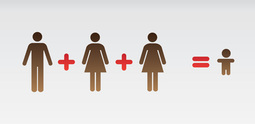|
4/9/2015 0 Comments 3 People, 1 Healthy Child By Kaitlynn Bayne Recently, the UK has decided to pass a law allowing a baby to be created by three people. At first thought, you might wonder why this would be necessary. However, this technique was actually created as a way to prevent mitochondrial defects being passed on to a child from its mother. Defects in mitochondria can cause damage to the brain, degrading muscle, heart failure and blindness. There are two different ways this technique can be done. First, you take the nucleus from the embryo of the parents and you remove and destroy the nucleus of the donor. Then, you take the parents’ nucleus and add it to the donor’s embryo, which is then implanted into the wound. The second method is very similar, however, instead of using the parents’ embryo, it takes the nucleus from the mother’s egg. There are many people who disagree with this method because they believe it is allowing people to “play God.” But, although it isn’t natural, it does not mess with the DNA at all. It purely focuses on the mitochondria and transfers all of the genetic material from the parents’ nucleus into the healthy mitochondria of the donor. All this does is eliminate mitochondrial defects and allows a woman that passes along this genetic disease to have healthy children. This process was recently voted on in the UK and won 382-128. Another part of UK government still has to vote on this; however, if passed, it could be as early as next year for a baby of this kind to be born. Although the ethics are being questioned, I think it is an amazing discovery, especially for those who do carry genetic disorders. This is giving parents an opportunity they wouldn’t normally have- to have a healthy child. I think that is reason enough for the UK to pass this!
0 Comments
Leave a Reply. |
WELCOME, UMICH SCIENTISTAS!
CAMPUS PICS
WHAT'S NEWUPCOMING EVENTSPAST POSTS
October 2022
SORT BY TAG |
The Scientista Foundation, Inc. All Rights Reserved © 2011-2021 | Based in NY | [email protected]
The Network for Pre-Professional Women in Science and Engineering
The Scientista Foundation is a registered 501(c)(3) -- Donate!
The Network for Pre-Professional Women in Science and Engineering
The Scientista Foundation is a registered 501(c)(3) -- Donate!


 RSS Feed
RSS Feed